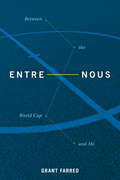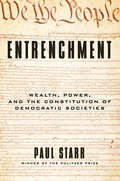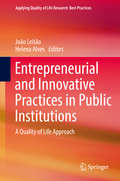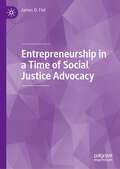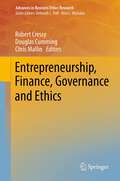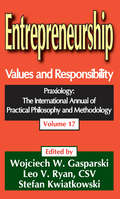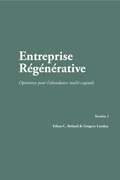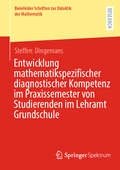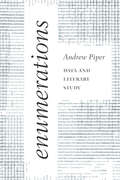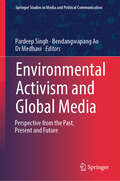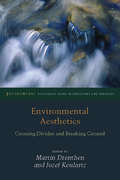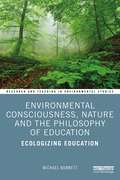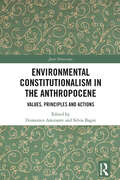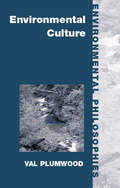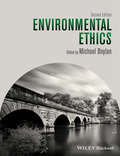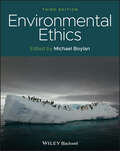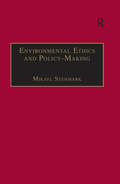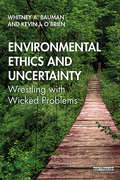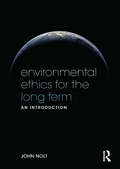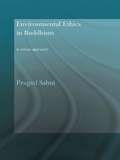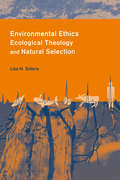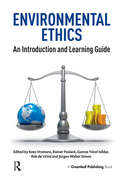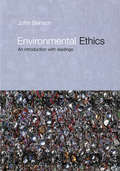- Table View
- List View
Entre Nous: Between the World Cup and Me
by Grant FarredIn Entre Nous Grant Farred examines the careers of international football stars Lionel Messi and Luis Suarez, along with his own experience playing for an amateur township team in apartheid South Africa, to theorize the relationship between sports and the intertwined experiences of relation, separation, and belonging. Drawing on Jean-Luc Nancy's concept of relation and Heideggerian ontology, Farred outlines how various relationships—the significantly different relationships Messi has with his club team FC Barcelona and the Argentine national team; Farred's shifting modes of relation as he moved between his South African team and his Princeton graduate student team; and Suarez's deep bond with Uruguay's national team coach Oscar Tabarez—demonstrate the ways the politics of relation both exist within and transcend sports. Farred demonstrates that approaching sports philosophically offers particularly insightful means of understanding the nature of being in the world, thereby opening new paths for exploring how the self is constituted in its relation to the other.
Entrenchment: Wealth, Power, and the Constitution of Democratic Societies
by Paul StarrAn investigation into the foundations of democratic societies and the ongoing struggle over the power of concentrated wealthMuch of our politics today, Paul Starr writes, is a struggle over entrenchment—efforts to bring about change in ways that opponents will find difficult to undo. That is why the stakes of contemporary politics are so high. In this wide-ranging book, Starr examines how changes at the foundations of society become hard to reverse—yet sometimes are overturned. Overcoming aristocratic power was the formative problem for eighteenth-century revolutions. Overcoming slavery was the central problem for early American democracy. Controlling the power of concentrated wealth has been an ongoing struggle in the world&’s capitalist democracies. The battles continue today in the troubled democracies of our time, with the rise of both oligarchy and populist nationalism and the danger that illiberal forces will entrench themselves in power. Entrenchment raises fundamental questions about the origins of our institutions and urgent questions about the future.
Entrepreneurial and Innovative Practices in Public Institutions
by João Leitão Helena AlvesThis volume discusses the importance of adopting entrepreneurial and innovation practices in the public sector, as mechanisms for detecting, dealing with and including citizens' social needs, with a reflection on positive determination of their quality of life. It focuses on critical reflection and rethinking the articulation between the dimensions of transformation - entrepreneurship and innovation - of New Public Management (NPM). In this way the book contributes to deepening knowledge about the implications of this change in the organizational paradigm of the public sector for citizens' quality of life, which is treated multi-dimensionally here, including citizens' well-being, purchasing power, happiness, trust, safety, experience and satisfaction. The volume constitutes a reference guide for decision makers, managers and policy makers engaged in the public sector who want to differentiate their performance by fostering entrepreneurial and innovative practices in the scope of public administration that can enhance citizens' quality of life. This volume is also a reference guide for scholars, policy makers and practitioners interested on public innovation.
Entrepreneurship in a Time of Social Justice Advocacy
by James O. FietThis book offers a critique of social justice theory and its impact on entrepreneurship scholarship. It traces its deep roots in postmodernism by positioning entrepreneurship within these new intellectual, social, and economic environments. It highlights current philosophical assumptions, with implications for boundary conditions that we apply as scientists. Science depends on theoretical assumptions and boundary conditions. Unfortunately, a glaring weakness in entrepreneurship research has been its general failure to identify these premises. No theory is universally applicable, so its assumptions and boundary conditions are what give it analytical power. Where do they come from? Simply stated, they come from a theory's philosophy of science. However, even more rare than stating assumptions and boundary conditions is to discuss a study's governing philosophy. In fact, no known research published in entrepreneurship has discussed a study's philosophical orientation. This provocative work details postmodern concerns related to critical theory, their origins, their status, and specifically how they impact entrepreneurship and those who are not designated as either the victimized or part of the white patriarchy. It will challenge the current direction of entrepreneurship research and confront the general acceptance of the tenets of postmodernism among management scholars.
Entrepreneurship, Finance, Governance and Ethics
by Douglas Cumming Chris Mallin Robert CressyThis book covers topics that are at the intersection of business ethics and governance as they pertain to entrepreneurship and finance. It is the first focused work that links entrepreneurship and finance to governance and business ethics, rather than explore them separately. The chapters highlight with empirical data the strong interplay between ethics in organizational efficiency and financial activity, and the role of legal settings and governance in facilitating ethical standards. They discuss novel and timely topics, particularly given the recent financial crisis and discussions on regulating ethical behaviour. This book will encourage future scholars to investigate the role of law and governance in mitigating corruption and facilitating integrity in entrepreneurship and finance.
Entrepreneurship: Volume 17, Values and Responsibility
by Stefan KwiatkowskiEntrepreneurship is the capability to be an entrepreneur. Beyond that idea is an ideology that a person's business actions result in industrial growth or technical advances, making that person a leader in the economic world. The contributors to this latest volume in the Praxiology Series, now available in paperback, are united in claiming that resourcefulness is a characteristic of people who take effective action, and that effectiveness is dependent on good, ethical purposes.The wide-angle definition of entrepreneurship presented in this volume demands that people and organizations engage in more than simple self-interest, but also display awareness of the prospects for wider growth and advances resulting from their decisions. In a period of financial crisis caused by irresponsible behavior by eminent would-be "entrepreneurs" the significance of this perspective should be evident. The editors claim that growth, not stagnation, advantage, not decline, are irreversible traits of business activity. This is why the very concept of entrepreneurship calls for values and responsibility—even more than in the past.The contributors develop the idea of entrepreneurship from both theoretical approaches religious and practical, or applied perspectives. This inter- and multidisciplinary approach offers readers a chance to rebuild trust in entrepreneurship.
Entreprise Régénérative
by Ethan Roland Gregory Landua Conrad Goulet & Aline PichéGénérer du profit par l’extraction de richesses vivantes et fondamentales à la vie telles que nos terres et nos eaux n'est plus acceptable. Les entreprises ont besoin d’un nouveau modèle pour interpréter notre monde, un nouveau processus de conception holistique et de prise de décisions. Les 8 formes de capitaux sont ce modèle. En développant les multiples formes de capitaux avec lesquelles nous transigeons à chaque jour, nous ouvrons la porte vers une approche évolutionnaire de l’économie et des profits. Entreprises régénératives précise la différence entre les systèmes dégénératifs, soutenables ainsi que régénératifs, articule les quatre facteurs d’une entreprise régénérative et dévoile les principes de conception d’une écologie d’entreprises régénératives. L’Institut d’Entreprise Régénérative offre aussi du mentorat et des services de consultation aux entreprises et corporations qui veulent faire le saut vers la régénération.
Entwicklung mathematikspezifischer diagnostischer Kompetenz im Praxissemester von Studierenden im Lehramt Grundschule (Bielefelder Schriften zur Didaktik der Mathematik #17)
by Steffen DingemansDie Qualität eines Unterrichts, der sich an den individuellen Voraussetzungen der Schulkinder orientiert, hängt maßgeblich mit der diagnostischen Kompetenz der Lehrkraft zusammen. Folglich ist die Entwicklung dieser eine grundlegende Aufgabe aller drei Phasen der Lehrkräftebildung. In der vorliegenden Studie wird das Praxissemester als struktureller Bestandteil der ersten Phase der Lehramtsausbildung fokussiert und die Wirkung auf die Entwicklung mathematikspezifischer diagnostischer Kompetenz untersucht. Den Kern der als mixed-method angelegten längsschnittlichen Evaluation stellen vier Videovignetten dar, zu denen die Studierenden aus dem Grundschullehramt in einer Online-Umfrage mit offenen Antwortformaten aufgefordert wurden, die Lösungswege von Kindern zur Addition und Subtraktion fachlich angemessen zu analysieren. Die Ergebnisse bestätigen einerseits die geringe Effektivität vor allem der schulischen Praxisphase. Anderseits werden auf Basis der vorliegenden Daten relevante Bedingungsfaktoren herausgearbeitet und Verbesserungsmöglichkeiten für die universitäre und schulische Phase des Praxissemesters diskutiert.
Entwicklungspolitik: Eine Einführung in Zielsetzungen und Ergebnisse
by Joachim BetzEntwicklungsländer haben seit den 1990er Jahren rasche, aber höchst unterschiedliche Fortschritte gemacht. So weit, dass sich die Grenzen zu den traditionellen Industrieländern teilweise verwischt haben. Andererseits gibt es eine Reihe von meist fragilen Staaten, denen das nicht oder nur ansatzweise gelungen ist. Die Rede von der einen „Dritten Welt“ und gemeinsamen Entwicklungsproblemen erklärt also nur noch wenig. Stattdessen ist Entwicklung eine Anforderung an alle Staaten geworden, die in diesem Lehrbuch nach den wesentlichen Entwicklungszielen aufgeschlüsselt und bewertet werden.
Enumerations: Data and Literary Study
by Andrew PiperFor well over a century, academic disciplines have studied human behavior using quantitative information. Until recently, however, the humanities have remained largely immune to the use of data—or vigorously resisted it. Thanks to new developments in computer science and natural language processing, literary scholars have embraced the quantitative study of literary works and have helped make Digital Humanities a rapidly growing field. But these developments raise a fundamental, and as yet unanswered question: what is the meaning of literary quantity? In Enumerations, Andrew Piper answers that question across a variety of domains fundamental to the study of literature. He focuses on the elementary particles of literature, from the role of punctuation in poetry, the matter of plot in novels, the study of topoi, and the behavior of characters, to the nature of fictional language and the shape of a poet’s career. How does quantity affect our understanding of these categories? What happens when we look at 3,388,230 punctuation marks, 1.4 billion words, or 650,000 fictional characters? Does this change how we think about poetry, the novel, fictionality, character, the commonplace, or the writer’s career? In the course of answering such questions, Piper introduces readers to the analytical building blocks of computational text analysis and brings them to bear on fundamental concerns of literary scholarship. This book will be essential reading for anyone interested in Digital Humanities and the future of literary study.
Environmental Activism and Global Media: Perspective from the Past, Present and Future (Springer Studies in Media and Political Communication)
by Pardeep Singh Bendangwapang Ao Dr MedhaviThis scholarly work discusses the historical, contemporary, and prospective dimensions of environmental activism and its intersection with global media. It provides a comprehensive view of the pivotal role played by the media in shaping awareness concerning environmental challenges and catalyzing actions to address them. Drawing upon the insights of an interdisciplinary cohort of scholars, the book systematically examines the diverse aspects of the nexus between media and environmental activism. Chapter contributions establish the foundational framework for comprehending how media as a whole lend support to activism; delineate the historical trajectory of environmental activism; the construction of narratives within the political, economic, and social domains of society; scrutinize the function of mass media within the context of globalization, digitization, and social media; and elucidate how governance structures influence the environmental activism process. By introducing readers to the basic narrative in environmental activism, globalization, and media, this book will be an important source of information for researchers, academicians and students engaged in various interdisciplinary studies linked to media, environment and activism.
Environmental Aesthetics: Crossing Divides and Breaking Ground (Groundworks: Ecological Issues in Philosophy and Theology)
by Martin Drenthen Jozef KeulartzEnvironmental aesthetics crosses several commonly recognized divides: between analytic and continental philosophy, Eastern and Western traditions, universalizing and historicizing approaches, and theoretical and practical concerns. This volume sets out to show how these,perspectives can be brought into conversation with one another.The first part surveys the development of the field and discusses some important future directions. The second part explains how widening the scope of environmental aesthetics demands a continual rethinking of the relationship between aesthetics and other fields. How does environmental aesthetics relate to ethics? Does aesthetic appreciation of the environment entail an attitude of respect? What is the relationship between the theory and practice? The third part is devoted to the relationship between the aesthetics of nature and the aesthetics of art. Can art help “save the Earth”? The final part illustrates the emergence of practical applications from theoretical studies by focusing on concrete case studies.
Environmental Consciousness, Nature and the Philosophy of Education: Ecologizing Education (Research and Teaching in Environmental Studies)
by Michael BonnettThis book explores alternative ways of understanding our environmental situation by challenging the Western view of nature as purely a resource for humans. Environmental Consciousness, Nature and the Philosophy of Education asserts that we need to retrieve a thinking that expresses a different relationship with nature: one that celebrates nature's otherness and is attuned to its intrinsic integrity, agency, normativity and worth. Through such receptivity to nature's address we can develop a sense of our own being-in-nature that provides a positive orientation towards the problems we now face. Michael Bonnett argues that this reframing and rethinking of our place in nature has fundamental implications for education as a whole, questioning the idea of human "stewardship" of nature and developing the idea of moral education in a world of alterity and non-rational agents. Drawing on and revising work published by the author over the last 15 years, this book will be essential reading for students and scholars of environmental studies, environmental education, and the philosophy of education.
Environmental Constitutionalism in the Anthropocene: Values, Principles and Actions (Juris Diversitas)
by Domenico Amirante Silvia BagniThis book examines the relationship between man and nature through different cultural approaches to encourage new environmental legislation as a means of fostering acceptance at a local level. In 2019, the International Union of Geological Sciences (IUGS) recognised that we have entered a new era, the Anthropocene, specifically characterised by the impact of one species, mankind, on environmental change. The Anthropocene is penetrating the discourse of both hard sciences and humanities and social sciences, by posing new epistemological as well as practical challenges to many disciplines. Legal sciences have so far been at the margins of this intellectual renewal, with few contributions on the central role that the notion of Anthropocene could play in forging a more effective and just environmental law. By applying a multidisciplinary approach and adopting a Law as Culture paradigm to the study of law, this book explores new paths of investigation and possible solutions to be applied. New perspectives for the constitutional framing of environmental policies, rights, and alternative methods for bottom-up participatory law-making and conflict resolution are investigated, showing that environmental justice is not just an option, but an objective within reach. The book will be essential reading for students, academics, and policymakers in the areas of law, environmental studies and anthropology.
Environmental Culture: The Ecological Crisis of Reason (Environmental Philosophies #3)
by Val PlumwoodIn this much-needed account of what has gone wrong in our thinking about the environment, Val Plumwood digs at the roots of environmental degradation. She argues that we need to see nature as an end itself, rather than an instrument to get what we want. Using a range of examples, Plumwood presents a radically new picture of how our culture must change to accommodate nature.
Environmental Ethics
by Michael BoylanThe second edition of Environmental Ethics combines a strong theoretical foundation with applications to some of the most pressing environmental problems. Through a mix of classic and new essays, it discusses applied issues such as pollution, climate change, animal rights, biodiversity, and sustainability. Roughly half of the selections are original essays new to this edition.Accessible introduction for beginners, including important established essays and new essays commissioned especially for the volumeRoughly half of the selections are original essays new to this edition, including an entirely new chapter on Pollution and climate change and a new section on SustainabilityIncludes new material on ethical theory as a grounding for understanding the ethical dimensions of the environment, our interactions with it, and our place in itThe text incorporates helpful pedagogy, including extensive editorial material, cases, and study questionsIncludes key information on recent developments in the fieldPresents a carefully selected set of readings designed to progressively move the reader to competency in subject comprehension and essay writing
Environmental Ethics
by Michael BoylanThe latest edition of an essential resource in the theory and applications of environmental ethics In the newly revised Third Edition of Environmental Ethics, internationally renowned philosopher Michael Boylan delivers another accessible introduction for students new to ethics, and an invaluable reference for scholars of all levels. The anthology includes important essays, both established and contemporary, as well as eight brand-new contributions commissioned specifically for this edition. This new material is the foundation for students# understanding of the most recent ethical debates on the environment and humanity's place within it. The balanced combination of new material on recent developments in the field and well-known, foundational articles appears alongside helpful pedagogical materials, including case studies and sample questions. The book brings students up to speed on all the main themes in the area, including worldview arguments for environmentalism, the anthropocentric vs. biocentric debate, and a variety of applied environmental problems. Environmental Ethics also offers: A thorough introduction to the theoretical background of environmental ethics, including discussions of ethical reasoning, nature, and the tragedy of the commons Comprehensive explorations of eco-feminism and social justice, aesthetics, and deep ecology Practical discussions of anthropocentric and biocentric justifications in environmental ethics In-depth examinations of applied environmental problems, including climate change, animal rights, sustainability, and public policy Perfect for undergraduate and graduate students studying topics in ethics, the environment, law, and policy, Environmental Ethics will also earn a place in the libraries of philosophers with an interest in applied or environmental ethics, and industry consultants to ecologists, environmental scientists, or environmental policymakers.
Environmental Ethics and Policy-Making
by Mikael StenmarkEnvironmental issues raise crucial questions. What should we value? What is our place in nature? What kind of life should we live? How should we interact with other living things? Environmental management and policy-making is ultimately based on answers to these and similar questions, but do we need a new ethics to be able overcome the environmental crisis we face? This book addresses these important questions and explores the values that decision-makers often presuppose in their environmental policy-making. Examining the content of the ethics of sustainable development that the UN and the world’s governments want us to embrace, this book examines alternatives to this kind of ethics, and the differences in basic values that these make in practice. Offering a detailed analysis of the ethics that lie behind current policy-making as it is expressed in documents such as Agenda 21 and the Rio Declaration, this unique contribution to the field of environmental studies shows how different environmental ethical theories support different goals of environmental management and generate different policies when it comes to population growth, agriculture, and preservation and management of wilderness areas and endangered species. Mikael Stenmark concludes that policy-makers must take more seriously the value assumptions and conflicts connected to environmental issues, and state explicitly on what values their own proposals and decisions are based and why these should be accepted. Those studying environmental issues or environmental philosophy will find this accessible text invaluable in presenting a clear understanding of environmental ethics and contemporary applications and policies.
Environmental Ethics and Uncertainty: Wrestling with Wicked Problems
by Whitney A. Bauman Kevin J. O'BrienThis book offers a multidisciplinary environmental approach to ethics in response to the contemporary challenge of climate change caused by globalized economics and consumption. This book synthesizes the incredible complexity of the problem and the necessity of action in response, highlighting the unambiguous problem facing humanity in the 21st century, but arguing that it is essential to develop an ethics housed in ambiguity in response. Environmental Ethics and Uncertainty is divided into theoretical and applied chapters, with the theoretical sections engaging in dialogue with scholars from a variety of disciplines, while the applied chapters offer insight from 20th century activists who demonstrate and/or illuminate the theory, including Martin Luther King, Rachel Carson, and Frank Lloyd Wright. This book is written for scholars and students in the interdisciplinary field of environmental studies and the environmental humanities, and will appeal to courses in religion, philosophy, ethics, politics, and social theory.
Environmental Ethics for the Long Term: An Introduction
by John NoltBroad in scope, this introduction to environmental ethics considers both contemporary issues and the extent of humanity's responsibility for distant future life. John Nolt, a logician and environmental ethicist, interweaves contemporary science, logical analysis, and ethical theory into the story of the expansion of ethics beyond the human species and into the far future. Informed by contemporary environmental science, the book deduces concrete policy recommendations from carefully justified ethical principles and ends with speculations concerning the deepest problems of environmental ethics. Pedagogical features include chapter outlines, annotated suggestions for further readings, the explanations of key terms when first mentioned, and an extensive glossary.
Environmental Ethics in Buddhism: A Virtues Approach (Routledge Critical Studies in Buddhism)
by Pragati SahniEnvironmental Ethics in Buddhism presents a logical and thorough examination of the metaphysical and ethical dimensions of early Buddhist literature. The author determines the meaning of nature in the early Buddhist context from general Buddhist teachings on dhamma, paticcasamuppada, samsara and the cosmogony of the Agganna Sutta. Consequently, the author shows that early Buddhism can be understood as an environmental virtue ethics. To illustrate this dimension, the Jatakas are used as a source. These are a collection of over five hundred folk tales, which also belong to early Buddhist literature. This work gives an innovative approach to the subject, which puts forward a distinctly Buddhist environmental ethics that is in harmony with traditional teachings as well as adaptable and flexible in addressing environmental problems.
Environmental Ethics, Ecological Theology, and Natural Selection: Suffering and Responsibility
by Lisa SiderisLisa Sideris proposes a new way of thinking about the natural world, an environmental ethic that incorporates the ideas of natural selection and values the processes rather than the products of nature. Such an approach encourages us to take a minimally interventionist approach to nature. Only when the competitive realities of evolution are faced squarely, Sideris argues, can we generate practical environmental principles to deal with such issues as species extinction and the relationship between suffering and sentience.
Environmental Ethics, Ecological Theology, and Natural Selection: Suffering and Responsibility (Columbia Series in Science and Religion)
by Lisa SiderisIn the last few decades, religious and secular thinkers have tackled the world's escalating environmental crisis by attempting to develop an ecological ethic that is both scientifically accurate and free of human-centered preconceptions. This groundbreaking study shows that many of these environmental ethicists continue to model their positions on romantic, pre-Darwinian concepts that disregard the predatory and cruelly competitive realities of the natural world. Examining the work of such influential thinkers as James Gustafson, Sallie McFague, Rosemary Radford Ruether, John Cobb, Peter Singer, and Holmes Rolston, Sideris proposes a more realistic ethic that combines evolutionary theory with theological insight, advocates a minimally interventionist stance toward nature, and values the processes over the products of the natural world.
Environmental Ethics: An Introduction and Learning Guide
by Kees Vromans Rainer Paslack Gamze Yücel Isildar Rob De Vrind Jürgen Walter SimonAs the destructive consequences of environmental problems such as global warming, water scarcity and resource and biodiversity destruction have been felt ever more heavily, people are becoming more aware of the importance of and their responsibilities towards environmental protection. The causes of our problems are anthropogenic. The number of people working in what might be termed "environmental industries" or with environmental responsibilities in their day-to-day work has mushroomed. In many cases, however, individuals charged with protecting the environment have a set of empirical priorities: what *is* done, rather than moral priorities which consider what *should* be done. The need to harmonize environmental knowledge with ethical behaviour and thus achieve behavioural change and the internalization of environmentally ethical values has never been more urgent. This book, developed as part of an EU programme to diffuse the application of environmental ethics to decision-making on pollution control, is a response to the need for a restatement of environmental ethics and for a code of behaviour and set of values that can be internalised and adopted to guide the actions by individuals at the sharp end of protecting the environment: decision-makers and environmental experts/executives/staff working in municipalities and public/government organisations throughout the EU and Turkey. It is nothing short of an ethical training manual that will guide environmental experts/decision-makers in making sound judgements and decisions and will act as a bridge between environmental knowledge and environmental behaviour. The book will be essential reading for decision-makers and experts working in local authorities and governmental organisations with responsibility for environmental protection: for both graduate and postgraduate students in environment-related disciplines and for vocational education teachers with a focus on the environment.
Environmental Ethics: An Introduction with Readings (Philosophy and the Human Situation)
by John BensonPresupposing no prior knowledge of philosophy, John Benson introduces the fundamentals of environmental ethics by asking whether a concern with human well-being is an adequate basis for environmental ethics. He encourages the reader to explore this question, considering techniques used to value the environment and critically examining 'light green' to 'deep green' environmentalism. Each chapter is linked to a reading from a key thinker such as J.S. Mill and E.O. Wilson. Key features include activities and exercises, enabling readers to monitor their progress throughout the book, chapter summaries and guides to further reading.
